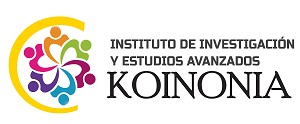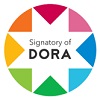Ecosistemas digitales de aprendizaje en el desarrollo de habilidades investigativas en estudiantes de educación
Resumen
Esta revisión sistemática tiene el objetivo de analizar el impacto de los Ecosistemas Digitales de Aprendizaje en el desarrollo de habilidades investigativas en estudiantes de educación, con especial atención al contexto de la República Dominicana. Se siguió la declaración PRISMA para revisiones sistemáticas, mediante una búsqueda exhaustiva en las bases de datos Scopus, Web of Science, ERIC y JSTOR de estudios publicados entre 2019 y 2024. El análisis de 45 estudios seleccionados revela que los Ecosistemas Digitales de Aprendizaje facilitan significativamente el desarrollo de competencias investigativas, especialmente cuando se implementan mediante enfoques pedagógicos como la enseñanza basada en investigación. Los hallazgos identifican mejoras sustanciales en habilidades de búsqueda de información, análisis crítico y procesamiento de datos. Los Ecosistemas Digitales de Aprendizaje representan herramientas prometedoras para transformar la formación investigativa en educación, aunque su efectividad está mediada por la superación de brechas digitales y la adecuada capacitación docente.
Descargas
Citas
Dziubaniuk, O., Ivanova-Gongne, M., & Nyholm, M. (2023). Learning and teaching sustainable business in the digital era: A connectivism theory approach. International Journal of Educational Technology in Higher Education, 20(1), 20. https://doi.org/10.1186/s41239-023-00390-w
Gegenfurtner, A., & Kollar, I. (2025). Designing effective digital learning environments. Routledge. https://doi.org/10.4324/9781003386131
Healey, M., & Jenkins, A. (2009). Developing undergraduate research and inquiry. The Higher Education Academy. AdvanceHE. https://n9.cl/oxvkt
Heikkinen, S., Saqr, M., Malmberg, J., & Tedre, M. (2025). A longitudinal study of interplay between student engagement and self-regulation. International Journal of Educational Technology in Higher Education, 22(1), 21. https://doi.org/10.1186/s41239-025-00523-3
Hu, S., Wang, W., Wang, X., & Yin, Y. (2024). Assessing the intention to accept inquiry-based teaching pedagogy among Chinese university students: An extension of the technology acceptance model. Frontiers in Psychology, 15, 1265047. https://doi.org/10.3389/fpsyg.2024.1265047
López Valerio, J. (2022). Estado transformación digital en la República Dominicana. Observatorio de Sociedad Digital. https://n9.cl/x3cyy
Naidoo, V., Sibiya, M. N., & Padayachee, P. (2023). Utilising the Healy and Jenkin’s Research Teaching and Curriculum Design Nexus to Transform Undergraduate Nursing Research Communities of Practice. South African Journal of Higher Education 37(1), 266-280. https://doi.org/10.20853/37-1-5659
Prado-Ortega, M. X., Carvajal-Romero, H. R., Centeno Sandoval, M. A., & Chamba Ojeda, S. D. P. (2025). Ecosistema de Aprendizaje Digital: Diseño de Espacio Educativo para Favorecer el Proceso de Formación Superior. Revista Tecnológica-Educativa Docentes 2.0, 18(1), 301-316. https://doi.org/10.37843/rted.v18i1.608
Ramírez Mendoza, P. N., Vargas Ayarza, A. ., Cedeño Ramírez, A. ., Leiva Gomez, L. E., & Calsin Pérez, R. A. (2025). El pensamiento complejo, la transformación digital y la IA en la educación superior. Horizontes. Revista De Investigación En Ciencias De La Educación, 9(37), 1027–1038. https://doi.org/10.33996/revistahorizontes.v9i37.966
Rojas, M. P., & Chiappe, A. (2024). Artificial Intelligence and Digital Ecosystems in Education: A Review. Technology, Knowledge and Learning 29, 2153–2170 https://doi.org/10.1007/s10758-024-09732-7
Sandoval-Henríquez, F. J., & Sáez-Delgado, F. (2023). Systematic Review on Research Competencies in Higher Education Students. Páginas de Educación, 16(2), 186-211. https://doi.org/10.22235/pe.v16i2.3340
Shingjergji, K., Iren, D., Urlings, C., & Klemke, R. (2025). Design Principles for Affective Online Learning: K. Shingjergji et al. Technology, Knowledge and Learning, 1-20. https://doi.org/10.1007/s10758-025-09867-1
Shonfeld, M., Cotnam-Kappel, M., Judge, M., Ng, C. Y., Ntebutse, J. G., Williamson-Leadley, S., & Yildiz, M. N. (2021). Learning in digital environments: a model for cross-cultural alignment. Education Tech Research Dev, 69(4), 2151–2170. https://doi.org/10.1007/s11423-021-09967-6
Tinmaz, H., Lee, Y. T., Fanea-Ivanovici, M., & Baber, H. (2022). A systematic review on digital literacy. Smart Learning Environments, 9(1), 21. https://doi.org/10.1186/s40561-022-00204-y
Torres Cañizalez, P. C., Cobo Beltrán, J. K., Agüero-Ynca, M. L., & García-Bravo, B. (2025). Producción científica en Scopus sobre competencias investigativas en estudiantes universitarios. Una revisión sistemática. Revista Científica UISRAEL, 12(1), 49-71. https://doi.org/10.35290/rcui.v12n1.2025.1232
Trixa, J., & Kaspar, K. (2024). Information literacy in the digital age: information sources, evaluation strategies, and perceived teaching competences of pre-service teachers. Frontiers in Psychology, 15, 1336436. https://doi.org/10.3389/fpsyg.2024.1336436
Vázquez-Villegas, P., Mejía-Manzano, L. A., Sánchez-Rangel, J. C., & Membrillo-Hernández, J. (2023). Scientific Method’s application contexts for the development and evaluation of research skills in higher-education learners. Education Sciences, 13(1), 62. https://www.mdpi.com/2227-7102/13/1/62
Wu, L., Hsieh, P. J., & Wu, S. M. (2022). Developing effective e-learning environments through e-learning use mediating technology affordance and constructivist learning aspects for performance impacts: Moderator of learner involvement. The Internet and Higher Education, 55, 100871. https://doi.org/10.1016/j.iheduc.2022.100871
Zhang, L., & Ma, Y. (2023). A study of the impact of project-based learning on student learning effects: A meta-analysis study. Frontiers in Psychology, 14, 1202728. https://doi.org/10.3389/fpsyg.2023.1202728
Derechos de autor 2025 Fatima Virginia Pons-Peguero, Belkis Jamileth Duarte-Nares

Esta obra está bajo licencia internacional Creative Commons Reconocimiento-NoComercial-CompartirIgual 4.0.
CC BY-NC-SA : Esta licencia permite a los reutilizadores distribuir, remezclar, adaptar y construir sobre el material en cualquier medio o formato solo con fines no comerciales, y solo siempre y cuando se dé la atribución al creador. Si remezcla, adapta o construye sobre el material, debe licenciar el material modificado bajo términos idénticos.
OAI-PMH URL: https://cienciamatriarevista.org.ve/index.php/cm/oai














